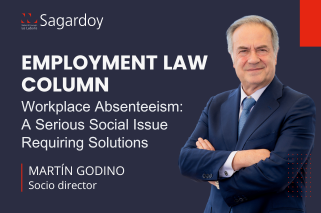November 2025
Much has been said over the past two or three years about the so-called “Intern Statute” and the proposed regulation concerning “the rights of individuals undertaking non-employment practical training in companies, institutions, or public or private organisations.” This is the terminology now used for the framework the Government seeks to promote.
Just this past Tuesday, 4 November, the topic made front-page news again, as the Council of Ministers approved the draft bill, thus giving the green light to its parliamentary processing—more than two years after reaching an agreement with trade unions. However, most media outlets already point out that the proposal will face significant challenges in moving forward, given the reservations expressed by several government coalition partners since June 2023 and the recent breakdown with another coalition partner.
The proposal has also revived the same wave of criticism that surrounded the original draft—supported only by the main trade unions (CCOO and UGT) and excluding employers’ associations and universities, two key stakeholders directly affected by the regulation, as it applies to both their companies and educational institutions.
According to its preamble, the draft regulation aims to eradicate the precarious conditions experienced by many interns, and establishes, among other measures: (i) a scope of application covering practical training linked to vocational education degrees, artistic or sports education, specialisations of the National Employment System, and both curricular and extracurricular university internships; (ii) measures to prevent “false interns” and to promote gender equality in access to these placements; (iii) confirmation that training in companies shall not entail an employment relationship, provided that the requirements of the regulation are met and the tasks correspond to the individual training plan, without replacing the functions of employees; (iv) the right of interns to reimbursement of expenses (travel and meals), rest periods, public holidays and vacations, and access to workplace facilities such as canteens or parking, under the same conditions as employees; (v) the right to adequate protection of interns’ health and against violence and harassment; (vi) a reduction in the number of hours for both curricular and extracurricular internships; (vii) a limit of five interns per supervisor and a cap whereby the total number of interns may not exceed 20% of the workforce; (viii) enhanced monitoring and control actions, including the creation of a Monitoring Commission and Labour and Social Security Inspectorate access to documentation related to these internships; (ix) a presumption of employment relationship where the activities performed replace those of an employee or are not directly related to the relevant curriculum; and (x) a sanctioning regime for non-compliance, with fines of up to €225,018, depending on the nature and severity of the violation.
The text and the process employed have generated strong opposition from other key stakeholders, namely employers’ organisations and universities, who argue that they should have participated in its drafting. The university sector criticises the way negotiations were handled, asserting that student internships are an academic matter, and questioning why only trade unions and employers should define their legal framework. They argue that once the distinction between academic internships and genuine employment contracts has been established, regulatory competence should rest with the Ministry of Universities and the universities themselves.
Meanwhile, employers’ organisations opposing the regulation consider it rigid and overly bureaucratic, warning that it will undermine students’ practical training, which they view as essential to ensure employability and bridge the gap between theoretical education and the world of work.
Additionally, the draft text is criticised for its vague and indeterminate terminology, likely to generate litigation, and for its implicit presumption of non-compliance, treating the existence of “false interns”—alongside “false self-employed” and “false cooperatives”—as the driving force behind the initiative. This suggests a presumed criminalisation of the business community, portraying it more as a potential violator of labour rights than as a key driver of the economy.
Of course, there is no doubt that it is both appropriate and necessary to regulate the relationship between interns and host entities, starting from the basic premise that such a relationship is not an employment one, and setting reasonable limits to prevent abuse and precariousness. However, this must be done within a rational and workable legal framework, one that truly serves its intended purpose: to facilitate effective practical training that enhances employability, rather than becoming a punitive instrument or a source of further judicial disputes that could overburden an already strained judicial system and render the new regulation ineffective.
María Jesús Herrera
Partner



